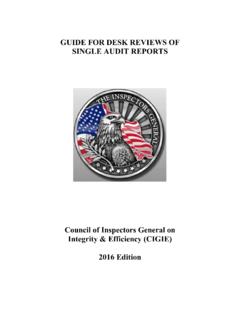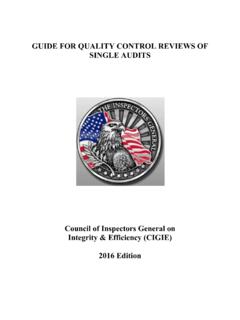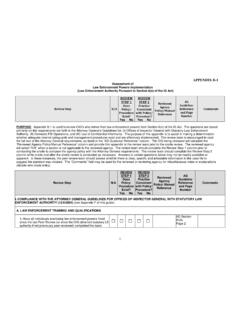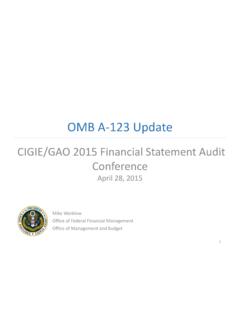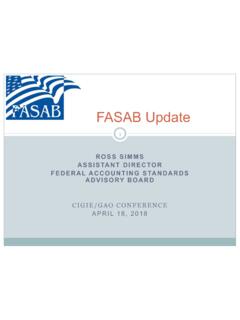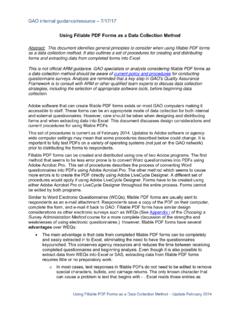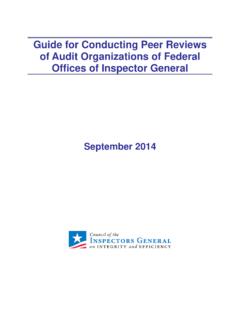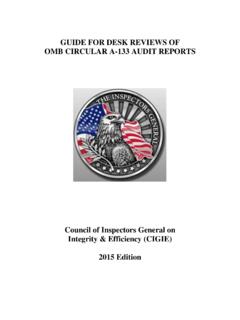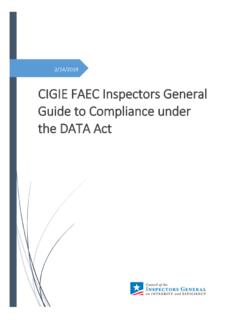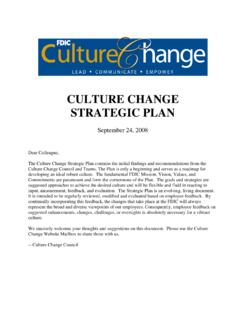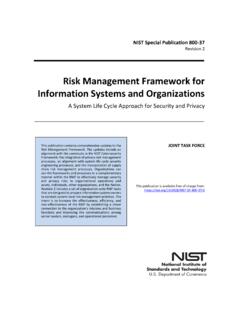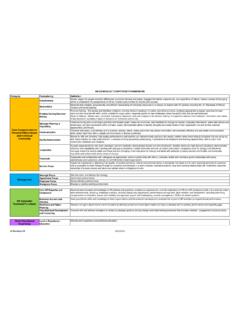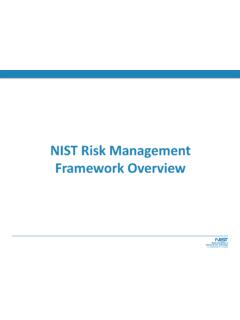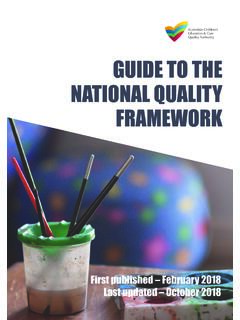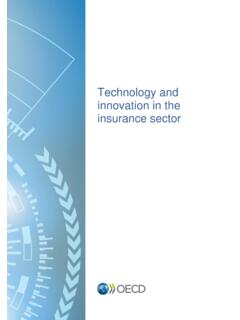Transcription of QUALITY STANDARDS FOR INVESTIGATIONS
1 QUALITY STANDARDS FOR INVESTIGATIONS November 15, 2011 Council of the Inspectors General on Integrity and Efficiency Authority: Section 11 of the Inspector General Act of 1978 (5 app. 3.), as amended. Mission: The mission of the Council of the Inspectors General on Integrity and Efficiency (CIGIE) shall be to address integrity, economy, and effectiveness issues that transcend individual Government agencies and increase the professionalism and effectiveness of personnel by developing policies, STANDARDS , and approaches to aid in the establishment of a well-trained and highly skilled workforce in the Offices of Inspectors General. CIGIE INVESTIGATIONS Committee: The Committee contributes to improvements in program integrity, efficiency, and cost effectiveness Governmentwide by providing analysis of investigative issues common to Federal agencies.
2 The Committee provides the CIGIE community with guidance, support, and assistance in conducting high- QUALITY INVESTIGATIONS . Provides input to the CIGIE Professional Development Committee and the Training Institute on the training and the development needs of the CIGIE INVESTIGATIONS community. The Committee actively engages the Assistant Inspector General for INVESTIGATIONS Committee to assist in carrying out the Committee's goals and strategies. Message From the Chairman of the CIGIE INVESTIGATIONS Committee The QUALITY STANDARDS for INVESTIGATIONS (QSI), since their inception in 1997, have successfully guided the Inspector General investigative community in producing high- QUALITY INVESTIGATIONS . They were modified in 2003.
3 This 2011 version will continue to guide the community in high- QUALITY investigative work. The Inspector General Reform Act of 2008 (IG Reform Act) provided that members of the Council of the Inspectors General on Integrity and Efficiency (CIGIE) shall adhere to professional STANDARDS developed by the Council ( 11(c)(2) of the IG Reform Act). For this 2011 edition of the QSI, the INVESTIGATIONS Committee has made technical changes that bring the document into full compliance with the IG Reform Act, including replacing all references to the PCIE (President's Council on Integrity and Efficiency) and the ECIE (Executive Council on Integrity and Efficiency) with CIGIE. The crafters of this QSI version, as did their predecessors, recognized the unique mission and varying statutory responsibilities of each CIGIE member.
4 As a result, each OIG will adhere to the QSI in accordance with its unique mission, circumstances, and department or agency. Throughout this version, you will also note a few minor changes for clarification, such as the definition of periodic training. Appendix C was also added as a handy, non-exhaustive list of laws and regulations relevant to investigative work. I want to thank the Assistant IG for INVESTIGATIONS (AIGI) Working Group for their diligence in soliciting input from the AIGI community and in preparing the QSI. I also want to thank the INVESTIGATIONS Committee for their watchful eye in finalizing the QSI. The members of the AIGI Working Group and of the INVESTIGATIONS Committee are listed in Appendix D. Carl W.
5 Hoecker Chairman, INVESTIGATIONS Committee CIGIE TABLE OF CONTENTS Page GENERAL A. B. C. Due Professional QUALITATIVE A. B. Executing C. D. Managing Investigative APPENDICES Job Task Illustration for Training Profile Illustration for Investigators ..B Non-Exhaustive Table of Legislation, Executive Orders ..C AIGI Working Group and INVESTIGATIONS Committee 1 PREFACE The STANDARDS and principles in this document, commonly referred to as QUALITY STANDARDS for INVESTIGATIONS (QSI), provide a framework for conducting high- QUALITY INVESTIGATIONS for Offices of Inspector General (OIGs) affiliated with the Council of the Inspectors General on Integrity and Efficiency (CIGIE).
6 Recognizing that members of the OIG community are widely diverse in their missions, authorities, staffing levels, funding, and day-to-day operations, certain foundational STANDARDS apply to any investigative organization. As such, the STANDARDS outlined here are comprehensive, relevant, and sufficiently broad to accommodate a full range of OIG criminal, civil, and administrative INVESTIGATIONS across the CIGIE membership. OIGs will incorporate the STANDARDS and principles outlined here into an operations manual or handbook. This should be accomplished in accordance with the OIG's particular mission, unique circumstances, and respective department or agency requirements. OIGs are encouraged to monitor changes in the laws, regulations, and other guidance cited here and revise their policies as necessary, pending future releases of the QSI.
7 In the event the QSI are found to be inconsistent with laws, rules, regulations, or other pertinent official pronouncements, the latter take precedence. The QSI categorize investigative STANDARDS as General and Qualitative. General STANDARDS address qualifications, independence, and due professional care. Qualitative STANDARDS focus on investigative planning, execution, reporting, and information management. This QSI supersede the STANDARDS published by the President's Council on Integrity and Efficiency and the Executive Council on Integrity and Efficiency dated December 2003. 2 QUALITY STANDARDS FOR INVESTIGATIONS GENERAL STANDARDS General STANDARDS apply to investigators and the organizational environment in which they perform.
8 The three general STANDARDS address qualifications, independence, and due professional care. A. QUALIFICATIONS The first general standard for investigative organizations is: Individuals assigned to conduct the investigative activities must collectively possess professional proficiency for the tasks required. This standard places upon the investigative organization the responsibility for ensuring that INVESTIGATIONS are conducted by personnel who collectively have the knowledge and skills required to perform the investigative activities. Guidelines INVESTIGATIONS vary in purpose and scope and may involve alleged violations of criminal or civil laws, as well as administrative requirements. The focus of an investigation can include the integrity of programs, operations, and personnel in agencies at Federal, State, and local levels of government; procurement and grant fraud schemes; environment, safety, and health violations; benefits fraud; the background and suitability of individuals for employment or a security clearance designation; whistleblower retaliation; and other matters involving alleged violations of law, rules, regulations and policies.
9 Some of these INVESTIGATIONS address both civil and criminal acts, ranging in significance from a misdemeanor to a felony. Others involve administrative misconduct issues. They often require using specialized investigative techniques; examining complex financial transactions, contracts, grants, and business operations; and interviewing government and corporate officials. A wide variety of skills and extensive knowledge are necessary to perform the broad range of activities required by these diverse INVESTIGATIONS . Investigative organizations should establish criteria to be used in recruiting and selecting the best qualified applicants. At a minimum, factors to be considered in employing entry-level candidates should include: education and experience, character, physical capabilities, and age.
10 Each of these factors may be controlled by legislation, regulation, or agency needs. Investigative organizations should review these criteria to 3ensure that they assist in providing the best qualified applicants. In addition, organizations should establish appropriate avenues for investigators to acquire and maintain the necessary knowledge, skills, and abilities; complete entry-level training, participate in in-service training; and receive professional development opportunities. Education It is desirable that all newly appointed investigators possess a 4-year degree from an accredited college. The knowledge acquired from a higher education will enable the investigator to deal with complex problems encountered in day-to-day investigative work.
